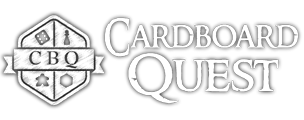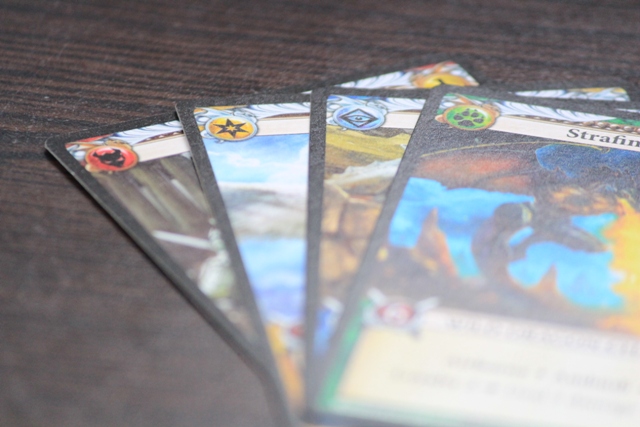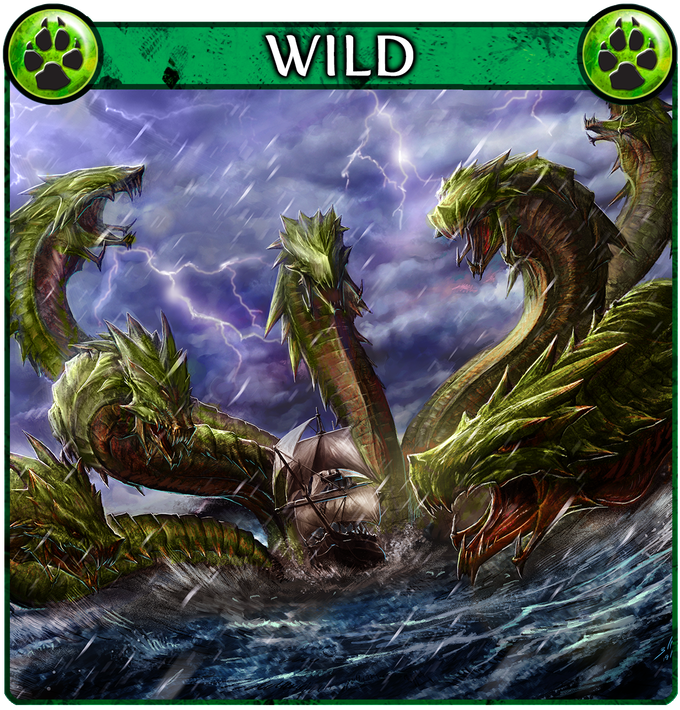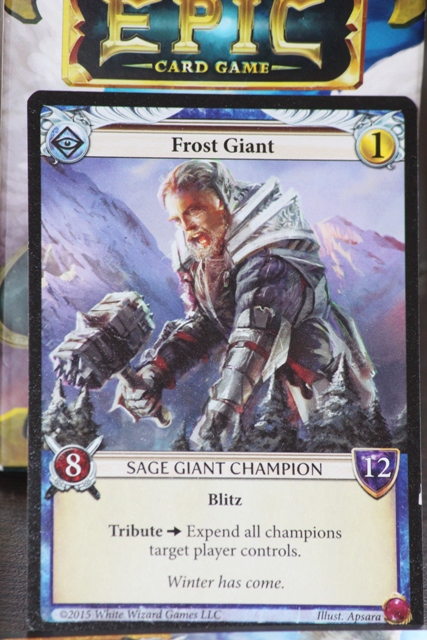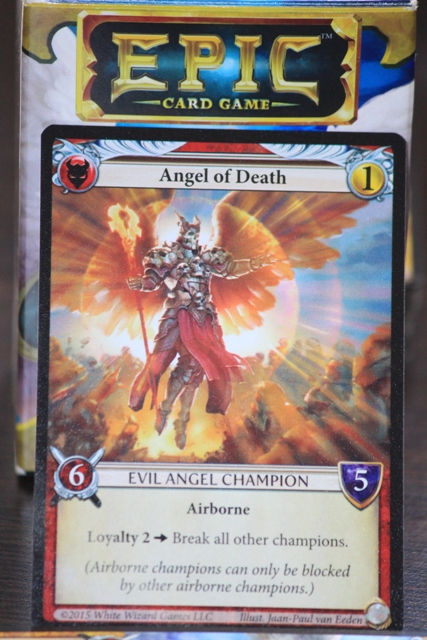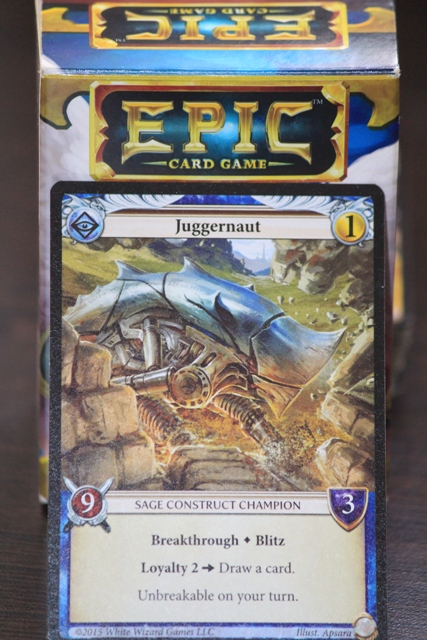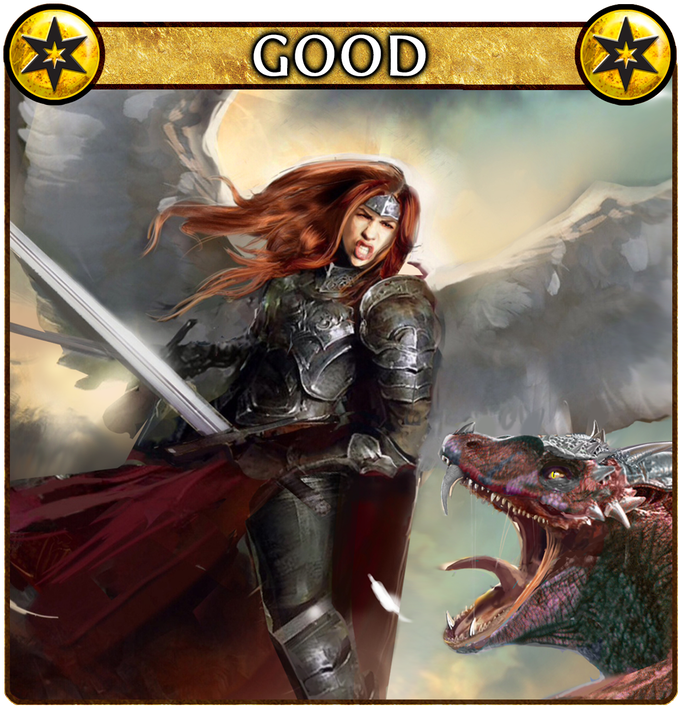Epic Card Game Review
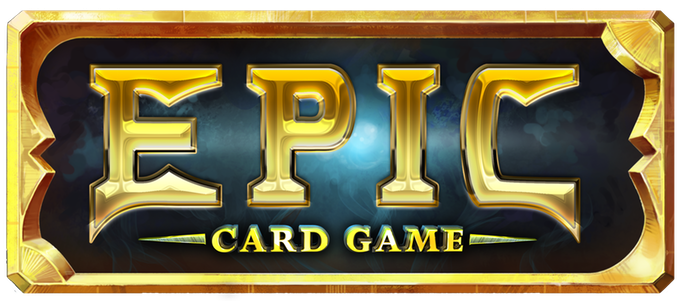
What is it? Epic is a non-collectable fantasy card game that offers the TCG experience from a single box, no boosters required. At least, that's what the standard press release says. Lofty claims? Perhaps, but White Wizard Games have a pretty great track record thus far.
Epic is probably the toughest review I’ve had to pen for CBQ thus far. I like it. Everyone I’ve played it against has been less than enthused. And not unlike finding out a new director has been appointed to helm the fifth film in a beloved franchise, the game has been subjected to a fair bit of criticism before the compact little box has even been opened.
And before I launch into a rules explanation and a final opinion, I’d like to deal with some of these criticisms right off the bat. The most ubiquitous of these is that Epic is an unabashed Magic the Gathering clone, and in certain cases I’ve seen reviewers wondering how White Wizard managed to get the game released without legal interference from Wizards of the Coast. It’s a fair observation, after all designers Robert Dougherty and Darwin Kastle are both former MTG champions and Epic is based around four alignments, each with their own colour and theme and many of the keywords used are simply reskinned MTG terms.
But let’s take a stab at being objective here – the Collectible Card Game genre is certainly not short of games that resemble MTG, even WotC’s own Pokemon CCG has more than a passing likeness. Similarly, I view MTG’s use of terminology as a type of game mechanic rather than something that’s particularly unique to the game. It just so happens that MTG happens to be the granddaddy and gets to throw its weight around, but docking points from a game because it happens to use the Flying ability is tantamount to saying that tearing up a card in Pandemic Legacy is a rip off (pun intended) of Risk Legacy.
Rifling through Epic cards for the first time, the art style and fantasy setting make it nigh impossible not to be reminded of MTG. But, and this is an important conjunction, I concern myself with how the games plays before I worry about what it looks like. And Epic is a vastly different play experience for those accustomed to the MTG experience.
The second common complaint I see leveled at Epic is that it isn’t a complete game out of the box – as in, the game doesn’t come with a lifetracker or with tokens. White Wizard Games’ highly acclaimed Star Realms at least had numbered cards to aid with keeping track of a player’s lifepool, surely Epic should too? Well, this is far less of a bugbear for me than it might be for some – it’s not inaccurate to assume that at least one of the players at a table owns a smart phone, and there are any number of simple and free lifetracking apps that can be downloaded. Heck, even a pair of dice would comfortably suffice. And if this ensures the cost of the game is kept as low as possible, I say extra components be damned.
So with these non-issues dealt with, let’s get to talking about Epic. I mentioned above that Dougherty and Kastle are the team behind Star Realms (a game I coincidentally played for the first time this weekend past) and they’ve certainly designed Epic with their ‘bang for your buck’ approach in mind. It’s not available locally just yet, but the game will most likely retail for R250, and this will net you 120 unique cards along with 8 double-sided token cards and a concise rulebook. It’s hard to argue that this isn’t tremendous value for money.
Epic forgoes the standard CCG ‘mana building’ route by implementing a rather clever resource allocation. On any particular turn, both players receive one gold coin. If they don’t use it, at the start of the next turn that gold is lost – in other words, you’ll only ever have one gold coin to spend on a turn. Card types are equally as concise and come in two flavours: champions and events. Champions are creatures that can be summoned to the field of battle and may possess powers that can be activated, whilst events are typically once off spells that have an immediate impact upon the game state. All of these cards have either a 1 gold coin cost or a zero cost, which means you are limited to playing only one 1 cost card per turn but as many zero cost cards as you choose (though naturally certain event cards may break this rule).
On your turn you draw a card and play any number (cost permitting) without fear of your opponent interfering up until you declare attackers and then pass. At this point, your opponent can play only event cards and declare defenders (in any order). Damage is assigned, you discard down to seven cards, any damage that was not sufficient to kill a creature is removed and all blocking champions are readied.
As with most TCGs, there are plenty of cards that bend the rules. Champions with the keyword Ambush can be played as events on any turn. Blitz champions can attack on the same turn they are deployed. If having to learn a dozen keywords has always dissuaded you from jumping into the TCG ocean, Epic isn’t likely to be any more encouraging. They’re all pretty straightforward, even more so for TCG veterans, but if your opponents eyes glaze over as you rattle off Tribute and Loyalty and Righteous and Banish, it’s going to be an uphill battle.
I touched on the games affinity with MTG earlier, and since it’s likely to be picked up by many MTG players I do feel it important to highlight a few key differences. The biggest, and the reason the game is called Epic, is in how quickly players are able to deploy incredibly powerful champions to the board. It’s entirely possible to deploy a Rampaging Wurm, which is a 14/14 champion for the cost of 1 gold, on your first turn. Combine that with the Dark Knight, a zero cost 5/7 champion, and since both of those champions have Blitz you could hit your opponent with 19 points of damage on the first turn of the game. Considering that you each start with 30 life, that’s a heck of an opening salvo.
A second key difference, and one that the Rules section of Epic’s BGG page testifies to, is that timing is far more straightforward. There’s no stack, no Instants or Permanents or Artifacts, each with their own set of increasingly complicated rules. This has resulted in dozens of players overcomplicating their approach and is also one of the aspects of Epic I really enjoy – experienced MTG players may well grasp the concepts and keywords better than a novice would, but they’re also forced to unlearn approaches embedded in the subconscious. If achieving success with Epic was purely down to mirroring a successful MTG strategy, there would be little to justify taking a closer look. But fortunately this is not the case – there’s a wealth of new strategies to learn and to puzzle out.
Thirdly, a single round could bear witness to more than one attack cycle. This particular rule took a while to click as the MTG attack process is deeply ingrained, but what it essentially means is that once damage has been assigned, as the attacking player you can choose to initiate a second attack if it’s legal for you to do so. Instead of setting up a play that would require multiple MTG turns, you can achieve a similar sense of feinting and deceiving your opponent into a mistake that results in an immediate impact on the same turn. A last few worth mentioning – you also win the game if you would draw a card from your deck but cannot, and you can Mulligan and redraw any number of opening cards losing health for each card you redraw.
Arguably Epic’s most impressive achievement is in the way it handles the deck-building/drafting aspect. You could simply shuffle all 120 cards and deal 30 to each player to form their decks, or split them into factions and assign a faction to each player. Open drafts. Pack drafts. Sealed, blind, epic cube – all the way up to fully constructed, Epic can be as quick and random or deeply strategic as you choose. Given my limited time with a review copy, the basic two-player game made up most of my sessions, and I have to say I was very impressed with Epic’s balancing. None of the games felt one-sided, with momentum shifting constantly. Multiplayer is also viable with just one base set, but having only played two-player I can’t comment on how well it plays with four.
Why then were so many of my opponents unimpressed? Well, I think I’ve managed to drill down to the core of the issue – Epic is swingy, incredibly swingy, and lacks the traditional rhythm of most TCGs. Is it a fault of the game, or simply a matter of personal preference? It’s fantastic to be able to throw down a 10/10 creature on turn one, but there are a plethora of events which nullify dangerous champions effortlessly. And unlike a game of MTG where you can make educated guesses about what your opponent can play based off the mana available, Epic is one black and bottomless pit of uncertainty. I like staring down the abyss, but I can appreciate that not everyone does. It also never quite feels like you’re building up to a particularly ‘epic’ play, no sense of setting ’em up so you can knock ’em down. The mountain is climbed on turn one, and you stay up there for the rest of the game.
Epic also lacks immediacy, a point driven home by the fact that I finally got around to playing Star Realms recently. Yes they’re mechanically different games, but Star Realms clicks immediately, strategies present themselves and the brain whirs into action, crunching the variables. Epic does have depth, mainly in constructed and drafting formats, but it’s a depth requiring commitment for a payoff not immediately apparent. Perhaps that immediacy is also absent because Epic lacks a strong central theme. Netrunner, Game of Thrones and even Star Realms all present plausible universes – there’s a reason MTG has invested much in building their world up around the Planeswalkers – and though Epic attempts to anchor its world in the four alignments of Good, Evil, Sage and Wild, I find the internal consistency lacking.
Lastly, though the artwork is indeed impressive, I found the depiction of the scantily clad female characters rather tiresome. Take a gander at the depiction of the Angel of Light above – it’s fantastic, isn’t it? So why does the Memory Spirit’s uniform apparently consist of a bikini? The notion that heaving bosoms are a fantasy art standard is outdated, but hey that’s just my opinion.
I opened this review talking about my struggle to present Epic as fairly as possible, and perhaps the only true and fair thing I can say is that I will be picking up a copy. Why? Because I’m willing to invest in unlocking the best Epic has to offer. I can see the depth the game presents at a drafting level, but I also appreciate that at its most basic it provides an opportunity for me to play with those who lack any semblance of TCG experience and expect a fair fight. And at that price, if after six months I arrive at a point where Epic still fails to impress, it won’t have cost me much at all.
But I can’t recommend it as an immediate purchase either. Stuart faced a similar dilemma when he reviewed Game of Thrones recently, in that the game requires an investment of time to truly appreciate its depth. But we both felt that lovers of that particular genre would likely see what we did after just a single play. Epic is a solid game, but I’d advise interested parties try out a friend’s copy first. I’ll certainly always be up for a game!
Review Copy of Epic Card Game was kindly provided by Boardgames.co.za for this article.

Pros:
- Excellent value for money
- Every card is unique
- Variable formats to match every level of player experience
- No mana required
- Impressive level of balance achieved
- No boosters required
Cons:
- ‘Epic’ nature of the cards negated by the plethora of cancel abilities
- There may be balance, but the initial sense of randomness may discourage many players
- Lacks rhythm
-
Steven Tu
-
grim
-
Steven Tu
-
-
